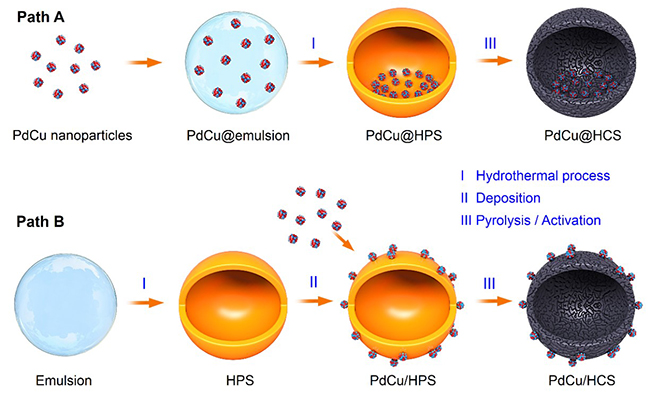Hollow nanoreactors have attracted attention in catalysis research due to their unique catalytic properties, especially the void-confinement effects.
Many factors affect catalytic performance, especially in the liquid phase hydrogenation reaction, such as the catalyst structure and reaction conditions.
Therefore, providing both comparative nanomaterials and reaction system with consistent reaction conditions to decouple the void-confinement effects from other factors is required to unambiguously ascribe and understand the void-confinement effects of the hollow nanoreactors.
Based on the two comparative nanoreactors, Prof. WANG Guanghui from the Qingdao Institute of Bioenergy and Bioprocess Technology (QIBEBT) of the Chinese Academy of Sciences (CAS), in collaboration with Prof. LIU Jian from the Dalian Institute of Chemical Physics (DICP) of CAS, investigated void-confinement effects in liquid-phase hydrogenation in a two-chamber reactor.
They reported a general strategy to synthesize a pair of hollow carbon sphere (HCS) nanoreactors with pre-synthesized PdCu nanoparticles encapsulated inside of HCS (PdCu@HCS) and supported outside of HCS (PdCu/HCS), respectively, while keeping other structural features the same.

Schematic illustration for the synthesis of PdCu@HCS and PdCu/HCS (Image by DONG Chao)
"Compared with PdCu/HCS, the PdCu@HCS can accelerate the hydrogenation of styrene via accumulation of reactant molecules, decelerate the hydrogenation of 2-vinylnaphthalene, and inhibit the hydrogenation of 9-vinylanthracene," said Prof. WANG.
In addition, the void space of the PdCu@HCS can alter the hydrodynamics of the intermediates, and correspondingly change the catalytic selectivity during hydrogenation of small alkynes. Moreover, a specific imine has been selectively produced over the PdCu@HCS by utilizing the shape-selective catalysis principle.
"These studies provide straightforward examples for clearly understanding and estimating the void-confinement effects of the hollow nanoreactors in liquid-phase hydrogenations," said Prof. LIU.
Moreover, various pairs of hollow nanoreactors can be designed based on the synthesis strategy, and employed as ideal models for study of catalytic mechanisms in various reactions. They can guide the design of efficient catalysts for specific chemical transformations and the development of nanoreactor reaction engineering.
This study was published in Angewandte Chemie International Edition. It was supported by National Natural Science Foundation of China, QIBEBT and the DNL Cooperation Fund, CAS. (Text by DONG Chao)